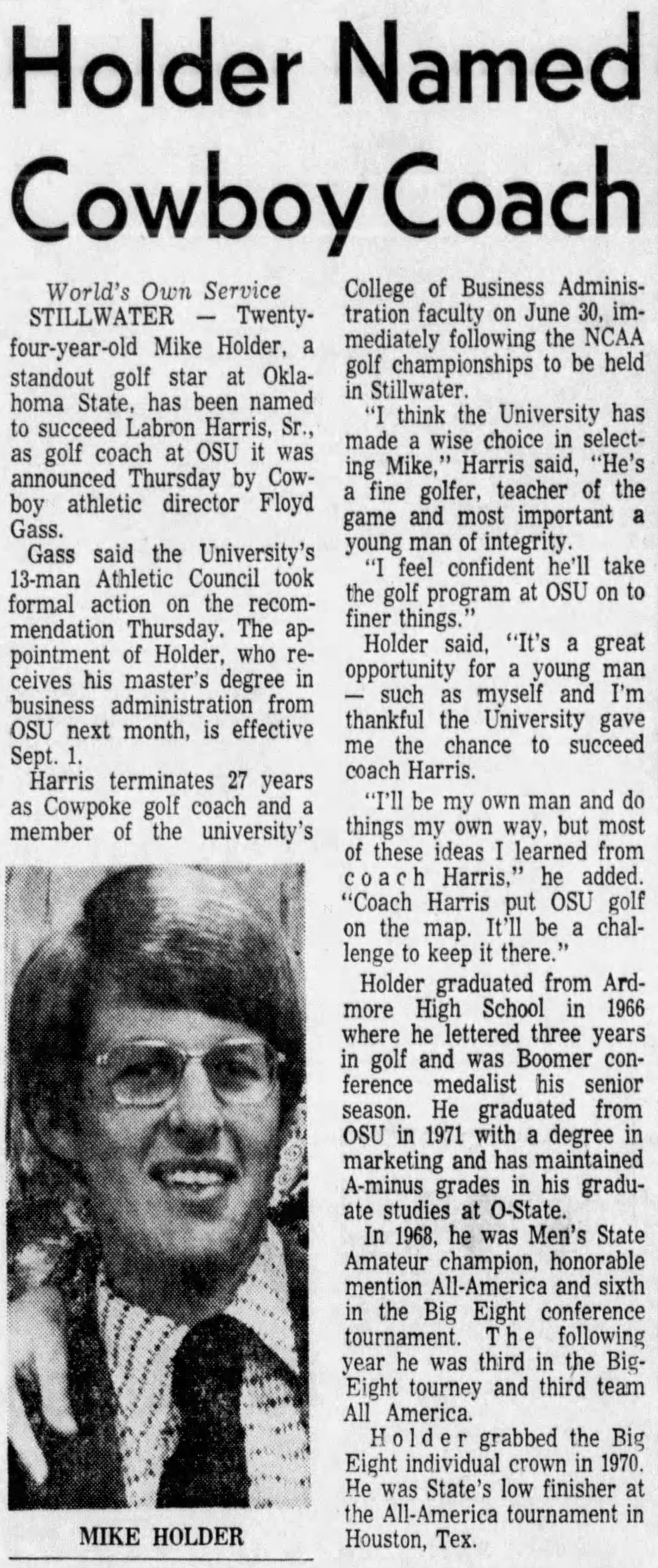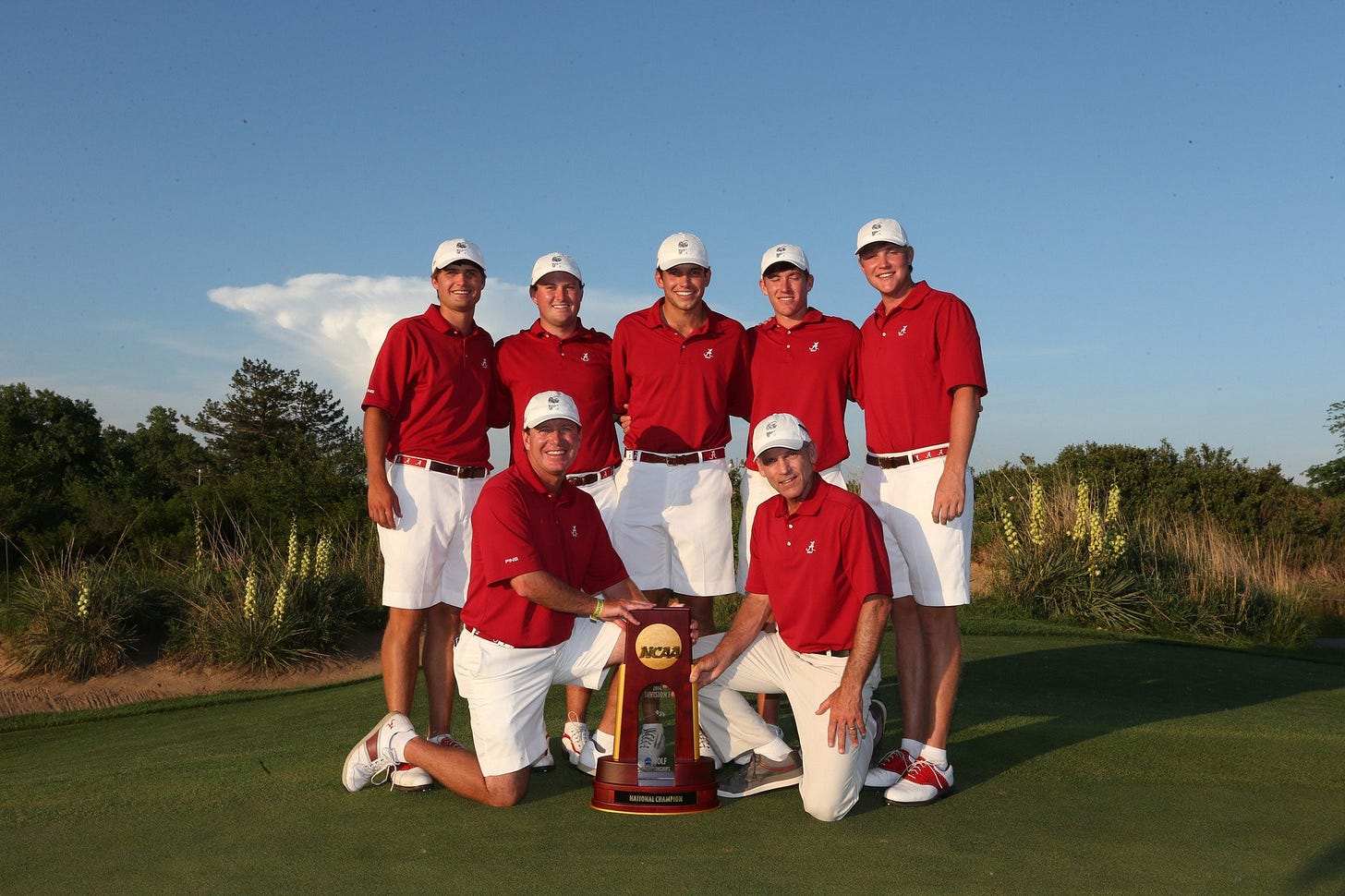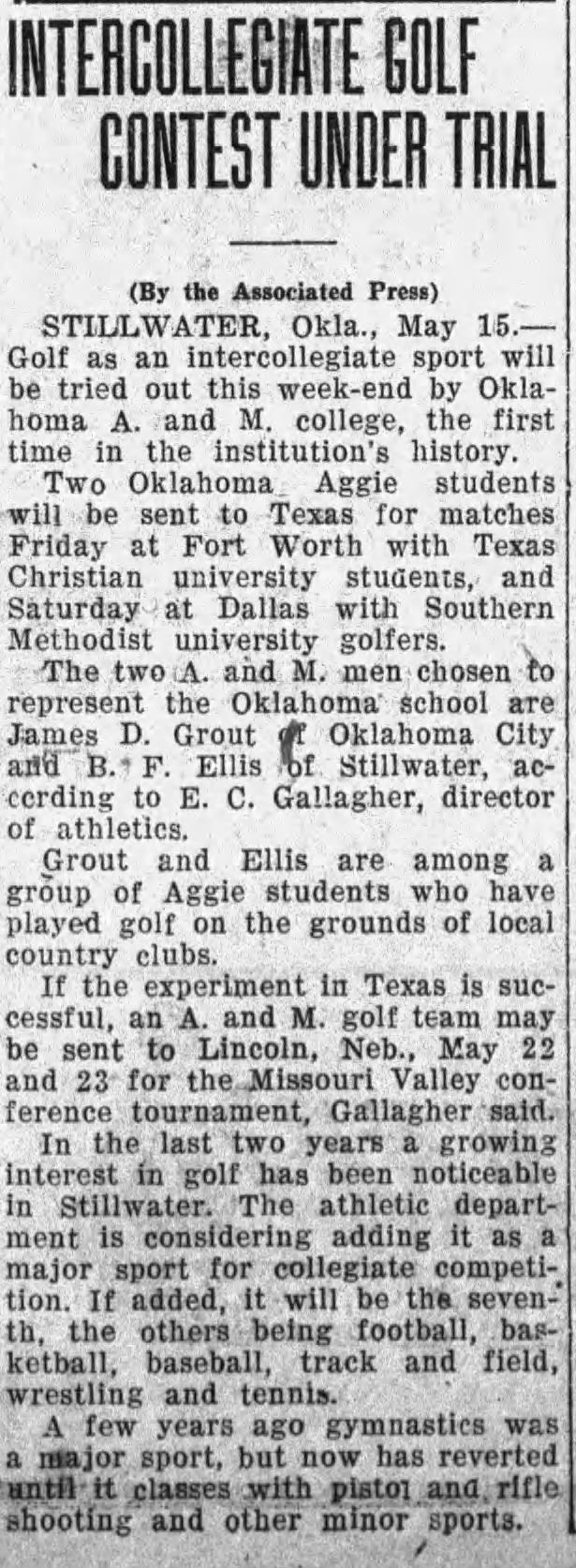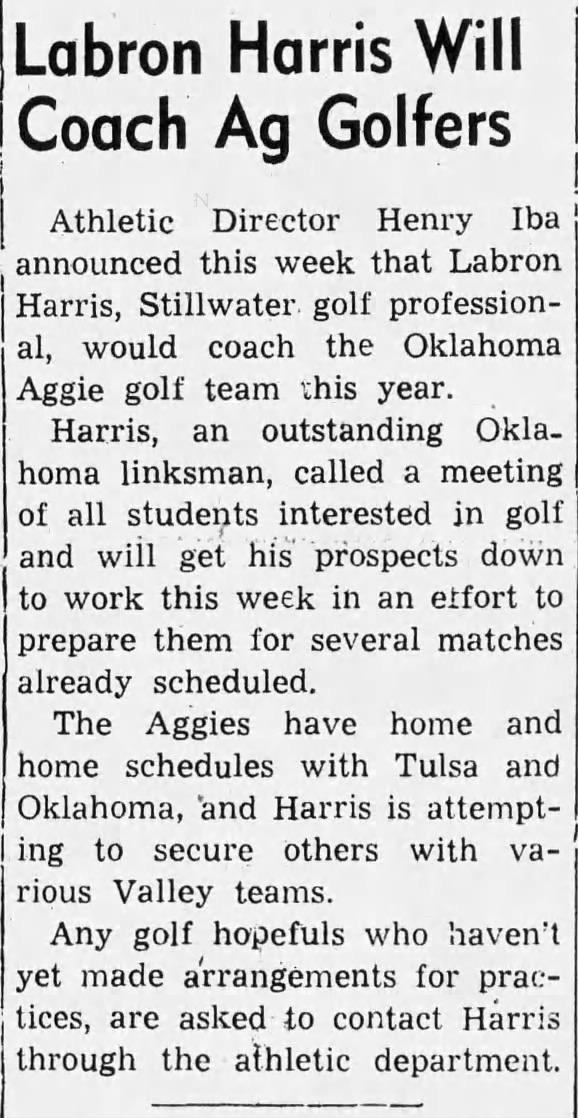Mike Holder’s Coaching Tree
Coaching trees have long been an area of interest in other sports such as football where fans and the coaches themselves make a big deal of tracing the “lineage” of a coach back as far as they can. One of the most notable examples of this is the Bill Belichick tree which includes numerous high profile and future hall of fame coaches. Despite college golf’s expansive history, this idea of tracing coaching trees has not received as much time or attention. It’s time we change that as we delve into college golf coaching history.
Mike Holder is a legend in college golf. From player to coach to athletic director, Holder’s career at Oklahoma State graduated from Cowboy to Cowboss over the course of 5+ decades. Even today, his presence is keenly felt as many of his innovations in the sport have become the standard for universities across the country. We thought it only appropriate to begin by exploring Coach Mike Holder’s extensive coaching tree, and get some thoughts on the topic directly from a few generations of coaches that make up branches on that tree.
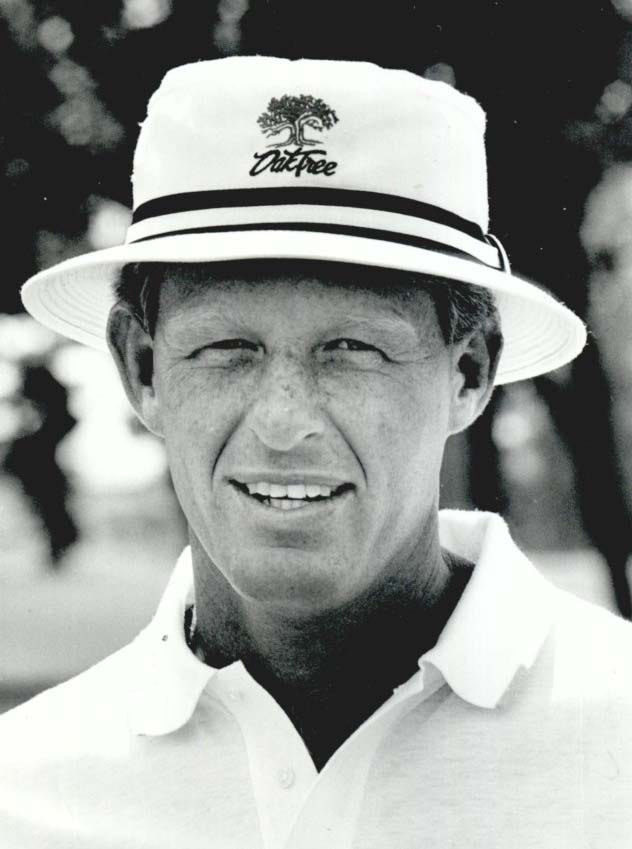
*Note: Underlined text is a link to a reference material and/or more details
BACKGROUND
Mike Holder has always been an OSU Cowboy. First, he was a three time All-American (honorable mention, 3rd team, 3rd team) in the 3 years that he played under Coach Labron Harris 1968-70. His senior year, Holder was the Big Eight Conference medalist and helped OSU capture another team title, the 12th in the 13 year existence of the conference.
After earning his B.S. in Marketing in 1970 then his M.B.A. in 1973 (both at Oklahoma State), Holder took over as head men’s golf coach in July, 1973, becoming just the second coach in program history1 after Coach Harris started Oklahoma State - then Oklahoma A&M - golf in earnest in 1947 and ran it for the next 26 years. Depending on how you want to treat the idea of the player-coach relationship and its effect on the former’s own coaching career, we could conceivably call this Coach Harris’s extended tree.
In his 32 year coaching career, Coach Holder amassed an incredible 179 team victories including: 8 NCAA team championships, 5 Regional titles, and 25 team conference championships. Following the 2004-05 season, Holder stepped into a new role as the Athletic Director at Oklahoma State, turning the men’s “Cowboy” golf program over to longtime assistant (and 2004-05 women’s head coach) Mike McGraw and bringing in Laura Matthews from Georgia as head coach for the women’s “Cowgirl” program.
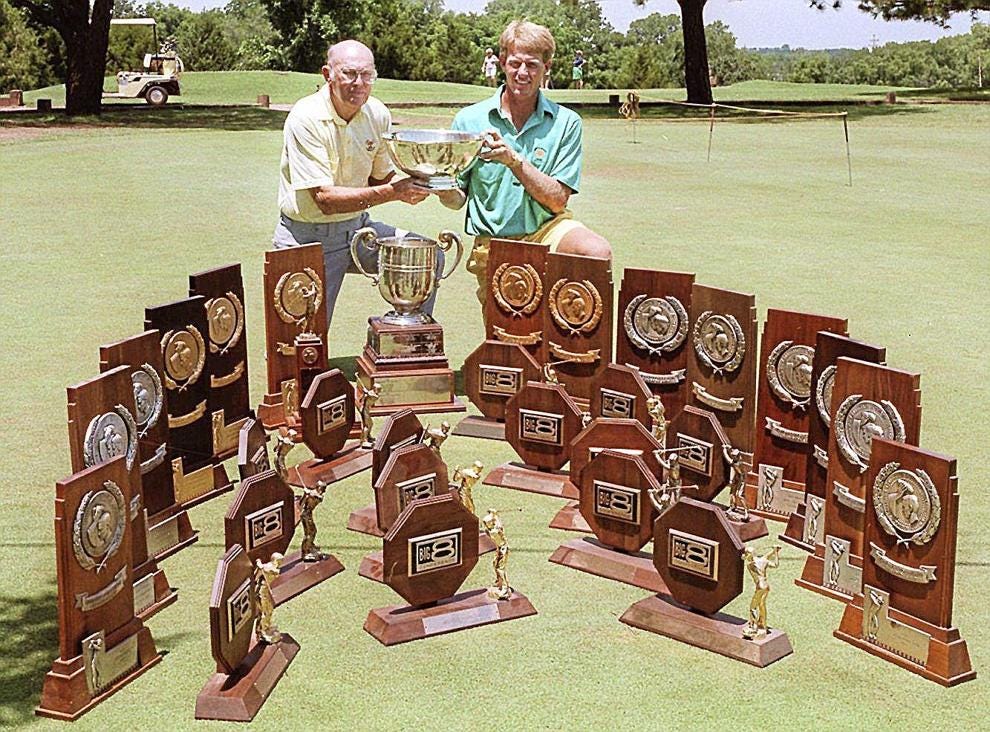
COACHING TREE
While the concept of assistant coaches in college golf was not new when Coach Holder took the reigns at OSU - Bobby Jones famously served as an assistant team manager while at Harvard - he is believed to have elevated the position when he hired Fred Warren as a paid full-time assistant golf coach for the 1978-79 season. Over his tenure, Coach Holder had a total of 4 assistant coaches serving in that same capacity: Fred Warren (twice), Bruce Heppler, Mike McGraw, and Alan Bratton. All four went on to be head coaches themselves - the latter two at OSU under Athletic Director Holder - which created an ever-widening tree that so far can directly or indirectly (as an assistant later at another program) claim an additional 5 NCAA Men’s and Women’s team titles.
Note that in the interest of completeness these branches include those recognized as volunteer assistant coaches and - as NCAA rules have changed in recent years - additional assistant coaches, creating some overlap in years of service. While many coaches will (rightfully) include former players when discussing their tree, we chose to only list coaches for this exercise. Perhaps in the future when our roster databases are more robust we will revisit this topic to expand these trees out further.
FRED WARREN [1978-79, 1984-86]
Former UCLA golfer Fred Warren joined the Oklahoma State staff to start the 1978-79 season, becoming Coach Holder’s first official assistant golf coach. After spending one season getting the best possible one-the-job training, 26-year-old Warren was named the men’s and women’s head golf coach at TCU, invigorating the program that had been revived just three years before and was described by local papers as being on life support. Coach Warren found success just as he promised, and remained in that position until 1984, winning a women’s NCAA championship in 1983.
Warren left TCU to again join the Oklahoma State staff as Coach Holder’s assistant men’s coach to start the 1984-85 season. Although Warren was not on staff for any of Oklahoma State’s NCAA championships, they did occur in his immediate proximity: 1978 (the year before he joined), 1983 (two years before he re-joined), and 1987 (the year after he left).
In the fall of 1986, Warren, now 34, was hired to restart the East Tennessee State (ETSU) golf program which had been a victim of budget cuts in 1983. One of the first things newspaper accounts noted was his tenacity for raising funds, something he likely took from Holder who is infamous for this skill. Proving he was the right hire, Coach Warren spent the next 33 years building a hall of fame career at ETSU (turned down the UCLA job in 1988), accumulating almost as many Coach of the Year awards (12) as Conference titles (17). One of his players, Brennan Webb (1993-97) makes an appearance elsewhere on the Holder Coaching Tree.
Jake Amos joined the staff for the 2017-18 season, and two years later took over head coaching responsibilities when Coach Warren retired in 2019. Coach Amos continued the program’s tremendous - perhaps still underappreciated - success through the 2023-24 season before leaving for the head coaching position at LSU.
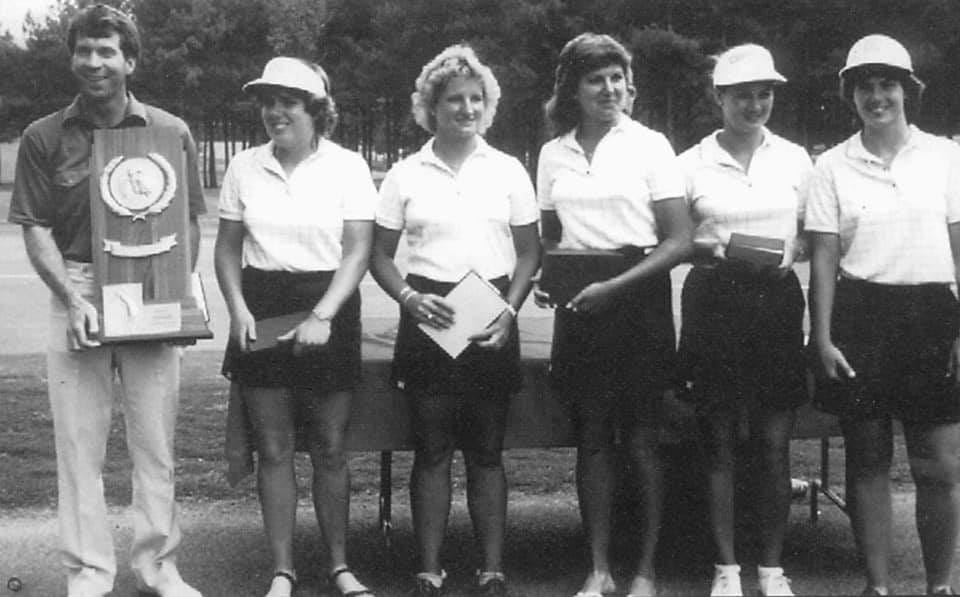
BRUCE HEPPLER [1991-95]
Bruce Heppler did not take the traditional path to college golf. After earning his accounting degree, he went to work as a CBA. That profession was short-lived, however, as after a year he entered the masters program at UMass. As he told Mike McGraw on the latter’s Better Than I Found It podcast interview (see below), while working in the intermural department there, Heppler took an opportunity to gain some extra pay by being the men’s and women’s golf coach at nearby Amherst. The next year, Heppler made his way to UNLV as a part of an internship that placed him in the athletic department. Doing the accounting for UNLV/Coach Dwaine Knight’s foundation turned into running events and then eventually becoming Coach Knight’s full-time assistant coach. Reports vary, but if Coach Warren was not the first full-time paid assistant college golf coach, then there’s a good chance that Heppler holds that distinction. At the very least, this was a uniquely rare opportunity.
After gaining two years of valuable experience under Coach Knight, Heppler then made the move to Oklahoma State. Here’s a fun What-If scenario for you: after his first season as Holder’s assistant, Heppler was said to be one of the finalists for the Arizona State head coaching job, left vacant by Steve Loy who resigned in Aug 1992 to become Phil Mickelson’s business manager. Instead, that position was filled by USC’s Randy Lein who became a Sun Devil legend.
Heppler ended up spending four seasons under Coach Holder, learning everything he could on being an ultra-successful college golf coach and even being an integral part of constructing the legendary Karsten Creek golf course. His final season at Oklahoma State culminated in one of the most dramatic NCAA championships in recent memory as the Cowboys overcame the Tiger Woods-led Stanford team in a one hole 5-count-4 playoff - or 4-count-4 in OSU’s case as one of their players was already on a scheduled flight out to the British Amateur. Leading the way for OSU was senior Alan Bratton, meaning there are three OSU coaches in the championship photo below.
A week or so after winning it all with OSU, Heppler got the call from Georgia Tech to replace Coach Puggy Blackmon who resigned the week of the NCAA championship to take the head coaching job at South Carolina. In his 29 years (and counting) at Georgia Tech, Coach Heppler has found tremendous success with over 20 NCAA Regional (6 wins) and National championship (4 runner-ups) appearances, two individual national champions, 14 ACC championships, and nearly two dozen National/ACC/Region coach of the year awards.
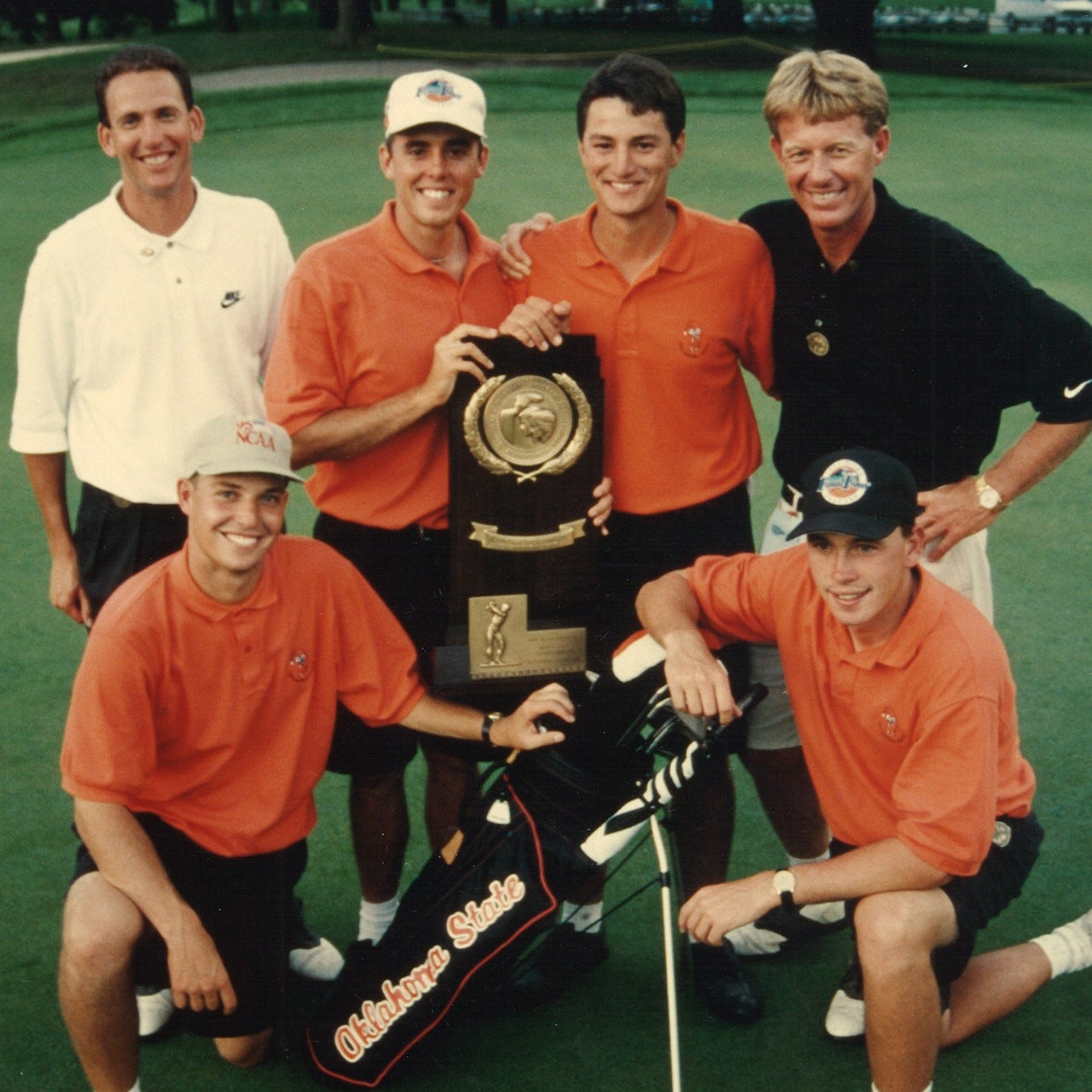
MIKE McGRAW [1997-2004]
In his book Better Than I Found It, Mike McGraw describes in wonderful detail his path coaching high school then college golf. His podcast with the same name is a fantastic continuation of his exploration of college golf coaching, and one of the early episodes includes this interview with Mike Holder:
Coach McGraw started his college coaching career at OSU in the fall of 1997. He proved to be an instrumental part of the program’s continued success, including capturing the 2000 NCAA team title. In 2003 McGraw won the inaugural Jan Strickland Assistant Coach of the Year Award in recognition of the tremendous season where he stepped into the head coaching role for five tournaments (team won three!) while Coach Holder recuperated from back surgery.
Assistant Coach McGraw took over as the “interim” head coach of the Cowgirl team for the 2004-05 season when Coach Amy Weeks stepped into the Senior Administrator role. His one season at the helm of the women’s program was highly effective, earning the Big12 Coach of the Year award. The next season he moved into the role of head coach of the Cowboy team after Coach Holder became AD Holder. Coach McGraw led the Cowboys to an NCAA team championship that first year in 2005-06, and came close a number of other times as OSU continued to be one of the most prominent programs in the country under his tenure.
At the end of the 2012-13 season, Coach McGraw was let go from OSU but immediately picked up by Alabama to serve with Coach Jay Seawell for the 2013-14 season. While there, McGraw was part of history as Alabama repeated as NCAA team champs (the most recent program to do that as of 2024).
It wasn’t long before Coach McGraw was back in a head coaching role. Beginning with the 2014-15 season, McGraw has led Baylor to new heights of success. He, along with an impressive array of young assistant coaches, has already led Baylor to more NCAA championship appearances than the entire rest of the program’s history prior to his arrival. The bar of excellence continues to be raised with each new program milestone, as noted in Coach McGraw’s Baylor profile:
The Bears achieved their first-ever No. 1 national ranking, won their first NCAA Regional title and advanced to NCAA Championship match play for the first time in program history, earning the best NCAA Championship finish in program history.
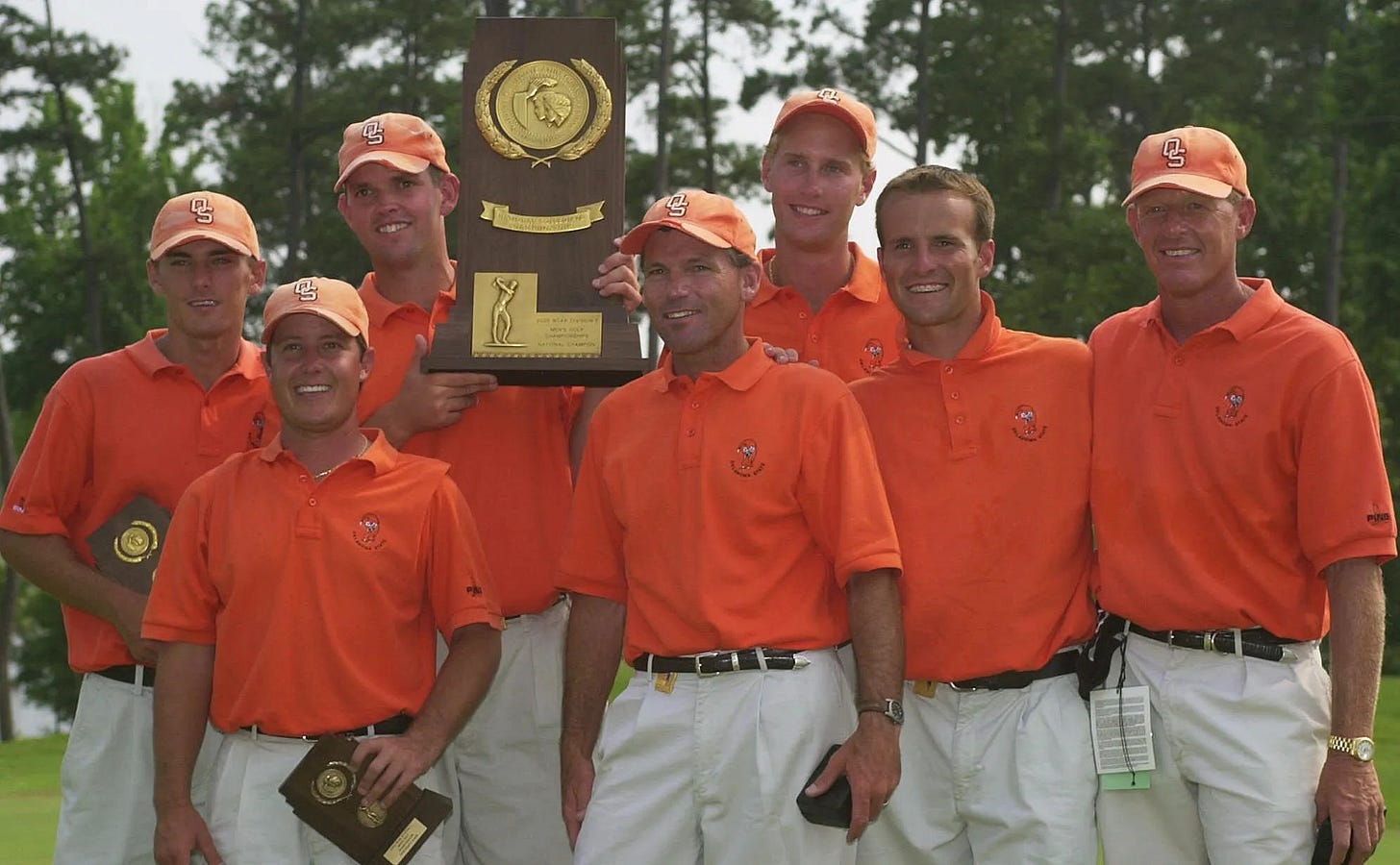
ALAN BRATTON [2004-05]
Alan Bratton played for Mike Holder 1991-95, famously defeating the Tiger Woods-led Stanford team for the 1994-95 NCAA team championship. After a stint playing professional golf, Bratton returned in 2004-05 to serve as an assistant for his former coach’s last year, as well as filling the same role for Coach McGraw who had moved over into the head coaching position for the OSU Cowgirl program. The next year (2005-06), McGraw took over as the men’s coach, AD Holder hired a women’s golf coach, and Bratton continued his role as assistant coach. The Cowboys found immediate success winning the 2006 NCAA championship, making Bratton one of the few people in college golf history to win a championship as both a player and coach. He’d soon find himself on an even smaller list when his Cowboys won the 2018 championship, becoming one of at most a handful of people to win championships as a player, assistant coach, and head coach. Before taking the reigns of the Cowboy program, however, Bratton got his first head coaching experience as the leader of the Cowgirls for two seasons: 2011-13.
This is where these trees can get a little complicated, so for visual ease you’ll see that we chose the simple structure above. Courtney (Jones) Roberts was Bratton’s first assistant as coach for the Cowgirl team 2011-13, and she took over head coaching responsibilities - eventually changing her name - when Bratton moved over to the men’s side. Note that both Brian Guetz and Donnie Darr each served as assistants under Bratton after he took over head coaching responsibilities for the Cowboy team in 2013: Guetz, continuing in the position he was already serving under McGraw, and then Darr returning from Ohio State where he had been the head coach from 2009-2015. We chose not to list Coach Darr’s assistants in this part of the tree because they all served under him at Ohio State.
As of 2024, Coach Bratton has led the Cowboys for 11 years (and counting). He continues the program’s high level of excellence he first contributed to under Coach Holder and then Coach McGraw.
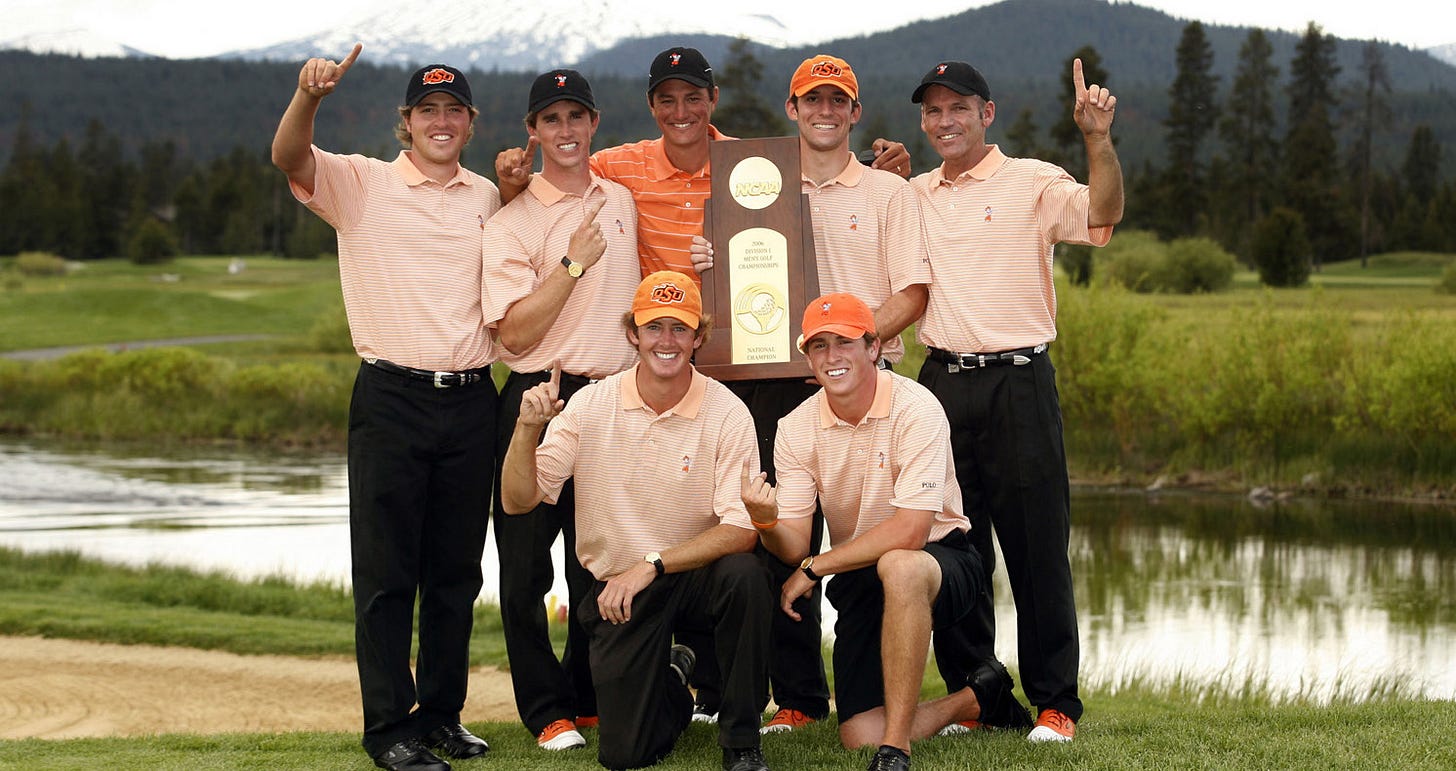

CONNECTING TREES
As with any coaching tree this extensive, Coach Holder’s tree has a number of interesting connections to others (that we will explore in the future) via assistants who either previously or later served under other head coaches. Let’s take a look at some of the connecting branches.
DWAINE KNIGHT TREE
One of the most prominent coaching trees in all of college golf is headed by Dwaine Knight [New Mexico/UNLV]. Bruce Heppler, an assistant under Coach Knight at UNLV 1989-91, serves as the most direct link between the Knight and Holder trees. A more tenuous connection comes via Drew McGee who, before serving as the assistant coach under Coach Heppler, was with Coach Glen Millican at New Mexico. A decade and a half prior to that, Coach Millican served as Coach JT Higgins’s assistant at the same school. Coach Higgins was another assistant under Coach Knight at UNLV, serving right after Heppler (1991-97). There are even more connections with Coaches Millican/Knight/John Fields (who Millican played for at New Mexico) that creates a rather interesting triangle between UNLV/New Mexico/Texas that we’ll break down soon. One final interesting link comes from Coach McGraw’s assistant coach Ryan Blagg (2012-20) who stayed on the Baylor staff in the same role in the changeover from former Coach Greg Priest (2003-14) to McGraw in 2014. Prior to assuming the head coach role at Baylor, Priest was an assistant coach to Fields at Texas (2000-03).
JAY SEAWELL TREE
Alabama’s Jay Seawell has a newer but highly successful tree that actually connects to the Holder tree in multiple ways. As with Knight’s tree, the most direct connection is with a shared assistant coach: in this case Mike McGraw who spent one season (2013-14) as Seawell’s assistant coach, resulting in a national championship. However, two more indirect connections exist. The first is with assistant coach Christian Newton who left Bama in 2007 to coach under Bruce Heppler at Georgia Tech. The most indirect connection is with Rob Bradley who was Seawell’s assistant coach in 2012-13 (resulting in the school’s first national championship) before leaving to coach at Purdue where one of his first assistant coaches was Jake Amos, Coach Fred Warren’s final assistant and eventual successor at ETSU.
THOUGHTS FROM THE COACHES
COACH MIKE McGRAW
I love the idea of tracing back to find coaching trees in college golf. There are so many things that Mike Holder taught me in my years at Oklahoma State, and I have always tried to pass on that knowledge to my assistant coaches. A coaching tree is a living, breathing library of coaching wisdom.
COACH MIKKEL BJERCH-ANDRESEN
Coach Holder’s Coaching Tree is central to understanding the college golf world. What a great piece this is by David. There are countless stories and lessons nested in this tree. As I got to both play and work for Coach McGraw, a lot of it has been passed down to me. But to see the tree laid out visually like this, is amazing. There’s probably a separate book to be written on each of the main branches of this tree.
Note: Mikkel runs a fantastic data-driven Substack which you can visit (and subscribe!) below
MIKE HOLDER’S LEGACY
We could - and will likely try to - spend an entire post attempting to list all of the various ways Coach Holder has transformed college golf. Born from ultracompetitiveness and a willingness to go the extra mile (or 10), Holder has directly or indirectly influenced change on every facet of the sport as we know it today: recruiting, training, fundraising, scheduling, travel, equipment, regular and post-season rules, club memberships for players at nearby courses, and even building your own course. He would consistently find an edge, watch others eventually adopt it, and then find another one; over and over again for decades. It’s not hard to see how this influenced his players and assistant coaches, and, in a way, connects him to practically all other coaching trees.
This Oklahoma State webpage dedicated to Mike Holder, who they describe as a “Cowboy For Life”, perfectly encapsulates his lasting legacy for the university and by extension college golf as a whole. We will likely never again see a single individual have as great of an impact on the entire sport as Mike Holder, and his ever expanding Coaching Tree is an ongoing testament to that indelible mark he leaves upon college golf.
Thanks for reading!
Oklahoma A&M/State golf goes back much further than Coach Labron Harris, but it is widely recognized by the University that the program as we currently know it was essentially (re)built from scratch by Coach Harris following WWII. In the interest of not contradicting this info, we used that as the basis for this assertion HOWEVER it should be noted that Oklahoma State put together this wonderful centennial book on their athletics which puts the start of their intercollegiate golf program at 1924 under the guidance of Tom Aycock and first awarded letters in 1936 under coach Harry Dolman. In fact, the Missouri Valley Conference record book reveals that Oklahoma State competed in their championship from 1936-1941. Golf was among the sports - tennis and swimming - that were dropped by the conference with the start of war and was likewise dropped by OSU in early January, 1942. Coach Harris was hired to be the (men’s) golf coach in mid 1946, reviving it as an official varsity sport and jumpstarting one of the most historically significant collegiate golf programs in the country.






